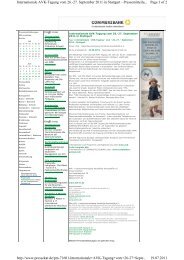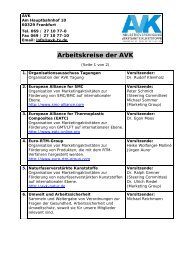Thermosets and thermoplastics set to compete for composite ... - AVK
Thermosets and thermoplastics set to compete for composite ... - AVK
Thermosets and thermoplastics set to compete for composite ... - AVK
Create successful ePaper yourself
Turn your PDF publications into a flip-book with our unique Google optimized e-Paper software.
��������� ����������<br />
While much attention is paid <strong>to</strong> the use of plastics in cars, the ecological <strong>and</strong> economic<br />
benefits of plastic solutions are just as important in commercial vehicles. David Vink<br />
looks at how thermo<strong>set</strong>s <strong>and</strong> <strong>thermoplastics</strong> are appearing in carbon <strong>and</strong> glass fibre<br />
<strong>composite</strong> monocoque haulage trailer designs<br />
�������������������������������������<br />
������������������������������������<br />
�n Oc<strong>to</strong>ber 2010, the Aldi Süd discount<br />
retail chain started <strong>to</strong> use a<br />
new refrigerated truck trailer <strong>for</strong><br />
deliveries <strong>to</strong> its German s<strong>to</strong>res. Team<br />
Composite (TTT) designed the<br />
trailer with a monocoque, thermo<strong>set</strong>ting<br />
(epoxide resin) based, carbon fibre<br />
rein<strong>for</strong>ced plastic (CFRP) structure.<br />
Be<strong>for</strong>e the Aldi Süd trucks hit the<br />
road, a 13.6m long, 2.6m wide modelwas<br />
on display at the IAA commercial<br />
vehicle fair in Hannover, Germany, in<br />
September.<br />
The company says benefits of the<br />
new structure include 25-30% lower<br />
fuel consumption because of the low<br />
overall 6.2 <strong>to</strong>nne weight (when the<br />
vehicle is unloaded). The structure<br />
includes refrigeration equipment, a lifting<br />
axle <strong>and</strong> roller shutter door, <strong>and</strong> has<br />
a more aerodynamic con<strong>to</strong>ur than conventional<br />
steel trailers.<br />
Aldi Süd says it saves 3 <strong>to</strong>nnes in<br />
weight with the new trailer, which can<br />
carry at least as much as the usual<br />
17-<strong>to</strong>nne payload. Fuel consumption is<br />
cut from 35 l litres <strong>to</strong> 26.5 l litres per<br />
100km, saving �11,400 over an average<br />
annual distance of 120,000km.<br />
Furthermore, the company says it<br />
will save emission trading costs in future<br />
because CO 2 emissions are reduced by<br />
around 15%. Other claimed benefits<br />
include lower overall life cycle costs, larger<br />
loading volume, palette carrier <strong>and</strong><br />
side protection functional integration, as<br />
well as improved driving safety <strong>and</strong> load<br />
security.<br />
TTT says the chassis <strong>and</strong> superstructure<br />
<strong>for</strong>m a watertight closed unit,<br />
keeping wind <strong>and</strong> turbulence at bay. A<br />
truck with engine power below 300bhp<br />
��<br />
�������������<br />
����������������������<br />
is more than adequate <strong>to</strong> pull the trailer,<br />
it says.<br />
Ria Kaiser, a TTT project engineer<br />
working on the CFRP trailer, says:<br />
“CFRP is a first choice <strong>for</strong> refrigerated<br />
trailers, as this material is temperature<br />
neutral – it does not exp<strong>and</strong> <strong>and</strong> does<br />
not fatigue”.<br />
TTT uses Zoltek’s low-cost industrial<br />
grade carbon fibre, in the CFRP<br />
<strong>composite</strong> <strong>to</strong> keep production costs<br />
low. Production costs of the present<br />
trailer are 20-30% higher than the typical<br />
�150,000 price <strong>for</strong> a conventional<br />
trailer, but the expense is amortised<br />
within two years because of lower fuel<br />
costs, Kaiser stresses.<br />
Kaiser also highlights the insulation<br />
provided by micro-porous silicic acid<br />
based vacuum insulation panels (VIP),<br />
made by Vaku-Isotherm, which are<br />
placed under the CFRP cladding. This<br />
ensures a long lifetime <strong>for</strong> the trailers<br />
once they go in<strong>to</strong> series production in<br />
2015, she says.<br />
By then, Kaiser believes that in<strong>for</strong>mation<br />
gained from practical load<br />
bearing studies means the company<br />
will be able <strong>to</strong> trim the trailer down<br />
even further. Meanwhile, two more<br />
������������������������<br />
������������������������<br />
����������������������<br />
������������������<br />
CFRP trailers will have entered service<br />
<strong>for</strong> Aldi Süd by the end of December<br />
2010. Another three pro<strong>to</strong>types should<br />
follow soon afterwards.<br />
By 2015 the company will move<br />
from manual construction, with a<br />
maximum capacity of two trailers per<br />
month, <strong>to</strong> industrial production of<br />
40,000 trailers per year, <strong>and</strong> aims <strong>to</strong><br />
gain a 10% share of the European trailer<br />
market by 2020.<br />
European trailer production has<br />
declined recently, but reached a peak of<br />
292,000 units in 2007, according <strong>to</strong> the<br />
Clear consultancy group.<br />
Investment in the CRFP trailer<br />
project so far <strong>to</strong>tals �3.2m, with contributions<br />
from a number of different<br />
partners, including the German state<br />
of Lower Saxony <strong>and</strong> Nbank.<br />
Companies involved in the project<br />
include the Fraunhofer IFAM institute,<br />
which specialises in production technology<br />
<strong>and</strong> applied material research<br />
<strong>for</strong> bonding <strong>and</strong> surface technology.<br />
Resin <strong>and</strong> adhesives specialist Sika provided<br />
the CRRP <strong>composite</strong>’s low viscosity<br />
epoxide resin.<br />
Other project partners include<br />
Lammilux Heinrich Strunz <strong>for</strong> CFRP<br />
������������������������������������������������
cladding sheets, Diab <strong>for</strong> s<strong>and</strong>wich<br />
<strong>composite</strong> panels, Exel <strong>for</strong> pultruded<br />
carbon <strong>and</strong> glass fibre rein<strong>for</strong>ced components,<br />
Airtech Europe <strong>for</strong> vacuum<br />
bagging <strong>and</strong> <strong>composite</strong> <strong>to</strong>oling materials,<br />
<strong>and</strong> Frimo <strong>for</strong> <strong>to</strong>ols.<br />
The CFRP monocoque structure is<br />
produced by boat building company<br />
Hatecke. Hatecke had previously only<br />
made GRP lifeboats <strong>and</strong> high-speed<br />
rescue boats at its Drochtersen-<br />
Kauts<strong>and</strong> boatyard. The Aldi Süd trailer<br />
is the company’s first CFRP project.<br />
Peter Hatecke says GRP <strong>and</strong> CFRP<br />
materials are similar enough <strong>for</strong> the<br />
company <strong>to</strong> manage the project based<br />
on its boatbuilding experience<br />
Longer term, Hatecke envisages his<br />
company developing in<strong>to</strong> “a real CFRP<br />
development centre <strong>for</strong> vehicle construction”.<br />
With carbon fibre prices<br />
expected <strong>to</strong> drop by around 50%, Hatecke<br />
believes his company will benefit<br />
from a boom in dem<strong>and</strong> <strong>for</strong> CFRP trailers.<br />
This should happen, he says, as long<br />
as no other <strong>for</strong>m of competing lightweight<br />
trailer is developed as an alternative<br />
<strong>to</strong> the TTT-designed CFRP trailer.<br />
However, an alternative <strong>to</strong> the TTTdesigned<br />
CFRP trailer is currently being<br />
developed in Germany. At the Composites<br />
Europe 2010 fair in September, the<br />
IVK plastics processing institute, based<br />
in Aachen, presented a flat-bed trailer<br />
made of polymerised thermoplastic<br />
PBT <strong>composite</strong>. The trailer was developed<br />
as part of a �2.6m European 6th<br />
Framework Cleanmould project.<br />
At the annual <strong>AVK</strong> federation of<br />
rein<strong>for</strong>ced plastics innovation awards,<br />
the institute won second prize in the<br />
���������������������<br />
�������������������<br />
���������������������������<br />
��������������������������<br />
����������<br />
environment category <strong>for</strong> a 13.6m<br />
Cleanmould glass fibre rein<strong>for</strong>ced PBT<br />
monocoque truck semi-trailer. IKV<br />
says the 600kg trailer part is “one of the<br />
world’s largest parts <strong>to</strong> be made in one<br />
shot in thermoplastic fibre rein<strong>for</strong>ced<br />
plastic”.<br />
The Cleanmould trailer part is<br />
made using a low 26 mPas viscosity<br />
CBT (cyclic butylene terephthalate)<br />
resin at 190°C. It enables high 60vol%<br />
rein<strong>for</strong>cement <strong>and</strong> production of large<br />
parts by liquid compound moulding<br />
(LCM), without the use of presses.<br />
IKV says that in contrast with thermo<strong>set</strong>s,<br />
CBT is clean <strong>to</strong> h<strong>and</strong>le as it is<br />
solid at room temperature <strong>and</strong> keeps<br />
the workplace free of emissions.<br />
A glass fibre rein<strong>for</strong>ced CBT <strong>composite</strong><br />
based trailer has an overall<br />
weight of 1,500kg, half of that of a steel<br />
version, cutting overall weight by 15%.<br />
The aerodynamic design reduces drag<br />
by 21% <strong>and</strong> the overall fuel consumption<br />
drops by 10%, as 20% less power is<br />
needed <strong>to</strong> pull a plastic trailer.<br />
A CBT <strong>composite</strong> trailer not only<br />
cuts CO 2 emissions <strong>and</strong> carries<br />
heavier loads, it is also more easily<br />
recycled at the end of its 40-year lifetime,<br />
double the 20-year lifespan of a<br />
steel trailer.<br />
To recycle the trailer, the post-use<br />
<strong>composite</strong> is cut <strong>and</strong> ground in<strong>to</strong> fibre<br />
lengths. These are mixed with virgin<br />
PBT resin then the mixture is plasticised<br />
in a compounding extruder. The<br />
extruder produces str<strong>and</strong>s or chopped<br />
str<strong>and</strong> granulate <strong>for</strong> compression or<br />
injection moulded new parts respectively.<br />
Although this process <strong>for</strong>ms a<br />
���������<br />
completely closed recycling loop, the<br />
new parts clearly differ from the trailer<br />
from which they are produced.<br />
IKV developed Cleanmould’s CBT<br />
resin infusion, injection system <strong>and</strong><br />
mouldings. Aside from Cyclics Europe,<br />
other Cleanmould partners are materials<br />
R&D company EPL Composite<br />
Solutions (<strong>for</strong>mer Euro-Projects), military<br />
boatbuilder BAE systems Surface<br />
Ships, boatbuilder VT Halmatic (<strong>for</strong>mer<br />
Vosper Thorneycroft) in the UK,<br />
Ahlstrom Glassfibre in Finl<strong>and</strong> <strong>and</strong><br />
trailer producer Basmiler in Portugal.<br />
EPL recently designed a 10m long<br />
modular lightweight fibre rein<strong>for</strong>ced<br />
<strong>composite</strong> semi-trailer as part of a<br />
three-year Roadlite project, in collaboration<br />
with VT Halmatic, Nottingham<br />
University in the UK <strong>and</strong> Leyl<strong>and</strong><br />
Technical Centre (LTC). The Roadlite<br />
trailer can be extended <strong>to</strong> 13.6m length,<br />
but the 10m unit saves 400kg, or 25%<br />
weight, compared <strong>to</strong> steel, says EPL.<br />
According <strong>to</strong> EPL, European road<br />
transport will grow 25% over the next<br />
15 years <strong>and</strong> it already accounts <strong>for</strong><br />
10% of <strong>to</strong>tal European energy consumption,<br />
contributing <strong>to</strong> over 30% of<br />
<strong>to</strong>tal CO 2 emissions.<br />
Whether the TTT/Hatecke thermo<strong>set</strong>ting<br />
CFRP, Cleanmould thermoplastic<br />
GRP or other lightweight trailers<br />
gain a larger market share than<br />
conventional steel trailers remains<br />
unclear.<br />
Ultimately it will depend on relative<br />
material <strong>and</strong> industrial production<br />
costs <strong>and</strong> the associated opportunities<br />
it presents on economic <strong>and</strong> environmental<br />
grounds.<br />
������������������������������������������������ ���������������������� ������������� ��










